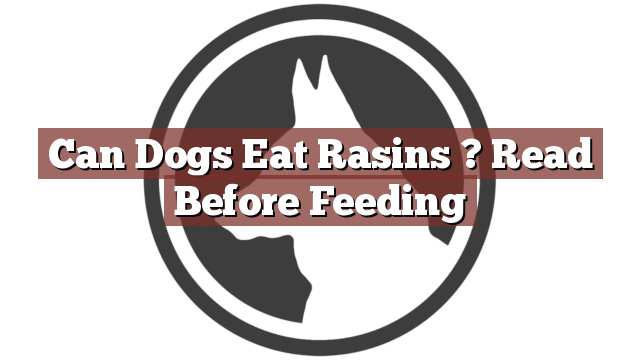Understanding Your Dog’s Dietary Needs
As a responsible and caring pet owner, it is important to be aware of your dog’s dietary needs. Dogs have different nutritional requirements compared to humans, and certain foods that are safe for us may actually be harmful or toxic to them. It is crucial to know what foods are suitable for your furry friend to ensure their overall health and well-being.
Can Dogs Eat Raisins? Read Before Feeding
Can dogs eat raisins? This is a question that many dog owners may have. Unfortunately, the answer is a resounding no. Raisins, along with grapes, can be highly toxic to dogs, even in small quantities. The exact substance in raisins that causes toxicity is still unknown, but it can lead to severe health complications and even be fatal for your beloved pet.
It is important to note that the toxic effects of raisins can vary from dog to dog. Some dogs may consume raisins without experiencing any immediate adverse effects, while others may show symptoms such as vomiting, diarrhea, abdominal pain, lethargy, and increased urination. In more severe cases, raisin ingestion can cause kidney failure, which can be life-threatening for your furry companion.
Pros and Cons of Feeding Raisins to Dogs
When it comes to feeding raisins to dogs, the cons heavily outweigh any potential pros. Raisins are high in sugar and can contribute to weight gain and dental issues in dogs, just like any other sugary treat. While some may argue that raisins are a good source of vitamins and minerals, it is important to remember that there are numerous other safe and healthy options available to meet your dog’s nutritional needs.
Additionally, the potential risks associated with feeding raisins to dogs far outweigh any perceived benefits. The exact mechanism by which raisins cause toxicity in dogs is still unclear, making it difficult to predict the reaction in each individual dog. Due to the serious and unpredictable nature of raisin toxicity, it is best to err on the side of caution and avoid feeding raisins to your furry friend altogether.
In Conclusion: Why Raisins Should Not Be Given to Dogs
In conclusion, it is crucial to understand that raisins should not be given to dogs under any circumstances. The potential toxicity of raisins can lead to severe health complications and even prove fatal for your pet. As a responsible pet owner, always prioritize your dog’s safety and well-being by avoiding any foods that are known to be toxic to them, including raisins.
If you suspect that your dog has ingested raisins or grapes, it is essential to seek immediate veterinary assistance. Early intervention can greatly improve the chances of a positive outcome. Remember, prevention is always better than cure, so be mindful of the foods you offer to your furry companion and ensure they have a balanced and nutritious diet suited to their specific dietary needs.
Thank you for taking the time to read through our exploration of [page_title]. As every dog lover knows, our furry friends have unique dietary needs and responses, often varying from one canine to another. This is why it's paramount to approach any changes in their diet with caution and knowledge.
Before introducing any new treats or making alterations to your dog's diet based on our insights, it's crucial to consult with a veterinarian about [page_title]. Their expertise ensures that the choices you make are well-suited to your particular pet's health and well-being.
Even seemingly harmless foods can sometimes lead to allergic reactions or digestive issues, which is why monitoring your dog after introducing any new food item is essential.
The content provided here on [page_title] is crafted with care, thorough research, and a genuine love for dogs. Nevertheless, it serves as a general guideline and should not be considered a substitute for professional veterinary advice.
Always prioritize the expert insights of your veterinarian, and remember that the health and happiness of your furry companion come first.
May your journey with your pet continue to be filled with joy, love, and safe culinary adventures. Happy reading, and even happier snacking for your canine friend!

